History of Notting Hill Carnival
Learn more about London’s world famous street party and why it’s so important for Black British culture…
Notting Hill Carnival has been bringing life, music and a sense of community to the streets of West London in the shape we now know it since September 1966.
Attracting an estimated two million visitors every year, and featuring an array of brilliant music, sound systems, and party goers, the event’s history goes back to the late forties and the arrival of HMS Windrush in Essex carrying hundreds of passengers from the Caribbean.
The carnival’s formation is rooted in Caribbean traditions and the cultural and social happenings surrounding the boat’s passengers, who made the journey in the hope of achieving a better life in the UK.
Now Notting Hill Carnival is a fixture in the capital’s events calendar, a celebration that takes place across every August bank holiday weekend as the culmination of the summer.
Here, we explore the event’s significant moments and dates over the course of its history from its conception to today.
You can also read our previous blog on Windrush and some of the heaviest hitting sound systems.
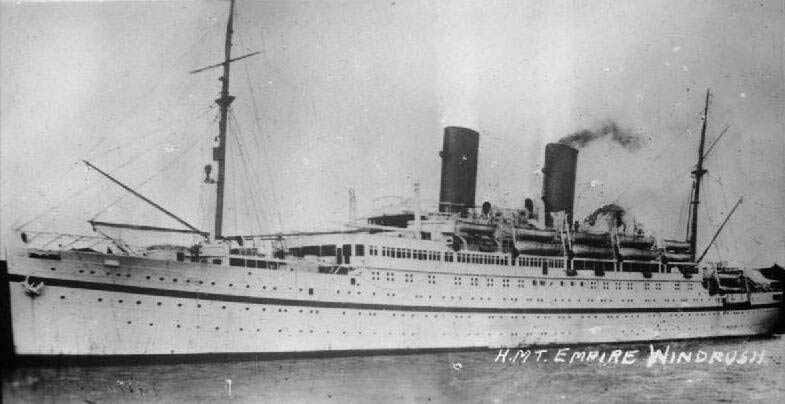
Credit: Royal Navy official photographer from the collections of the Imperial War Museums., Public Domain
1948 | HMS Empire Windrush arrives in the UK
The boat docked in the Port of Tilbury in Essex, reportedly carrying more than 800 citizens from the Caribbean. Many of the new arrivals made the journey seeking opportunities to help rebuild the UK in the wake of two World Wars.
Windrush wasn’t the first boat to arrive. Historian David Olusoga describes how, "in March 1947, the SS Ormonde transported 108 migrants from Jamaica to Liverpool. In December that year the Almanzora, carrying around 200 people from the West Indies, docked at Southampton."
1950 | The West Indies cricket team beat England at Lord's
The West Indies cricket team visited the UK in 1950 to play a four-match Test series against England.
West Indies ended up triumphing in the series 3-1 with the second Test at Lord's the first time that the West Indies had won a high profile match in England. It is also credited as one of the first times that the distinctive sounds of the Caribbean were given a prominent platform.
1950s | Racial tensions erupt
Still, after citizens from the Caribbean arrived, their welcome to the UK was not always friendly - and racial tensions began to surface throughout the 1950s.
Violence erupted out of the Teddy Boys movement, a group of young white men who took it upon themselves to seek out and attack members of London’s Black communities in various parts of the capital.
Notting Hill was a stronghold for Oswald Mosley’s Union Movement. This far-right movement galvanised the local white working-class population under the banner of “Keep Britain White”. Attacks on the Black communities of Notting Hill, London and Nottingham began and became commonplace as the fifties went on.
1959 | Kelso Cochrane’s murder
These tensions spilled out into increasing levels of violence with Antiguan-born carpenter Kelso Cochrane murdered in Notting Hill. The 32 year-old was attacked in May 1959 and later died in hospital. His killers were never caught after his death and there are ongoing efforts to put pressure on the authorities to re-open the case.
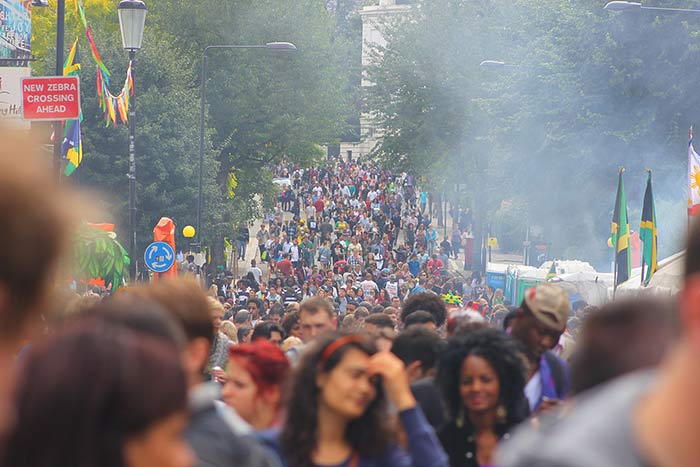
Credit:Robertsharp - Notting Hill Carnival, CC BY 2.0
1959 | Caribbean Carnival held
Claudia Jones, a Trinidadian human rights activist based in London, hosted the first ‘Caribbean Carnival’ at St Pancras Town Hall in response to this ongoing civil unrest.
She founded Britain's first major Black newspaper, the West Indian Gazette, in 1958 and organised the event the following year to lift up and inspire Black communities in the UK. She leveraged many of the connections she’d made in the media to make it happen. This celebration featured the slogan, "A people's art is the genesis of their freedom”.
1965 | Race Relations Act bans racial discrimination in public places
The Race Relations Act 1965 was the first piece of legislation in the UK to address the prohibition of racial discrimination that had grown to be commonplace during the previous decade. The act banned racial discrimination in public places and made the promotion of hatred on the grounds of ‘colour, race, or ethnic or national origins' an offence.
It was an attempt by the authorities to provide direct rebuttal to the hostilities and violence faced by many of those in the Black community who had moved to the UK.
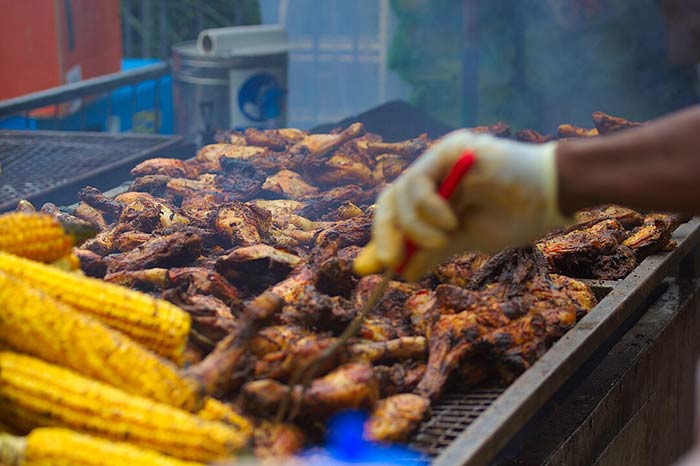
Credit: Barnaby Quincey CC BY 2.0
1966 | First Notting Hill Carnival
Notting Hill Carnival took its first steps into the outside world during the sixties.
Community activists Rhaune Laslett and Andre Shervington organised a street festival in an attempt to reduce tension. There was a procession and the Trinidadian musician Russell Henderson led his steel band through the streets, playing for the crowds that had arrived to join the event. This is thought to be the first time that the various elements of that all associated with today’s Notting Hill Carnival - the music, procession and sense community - came together.
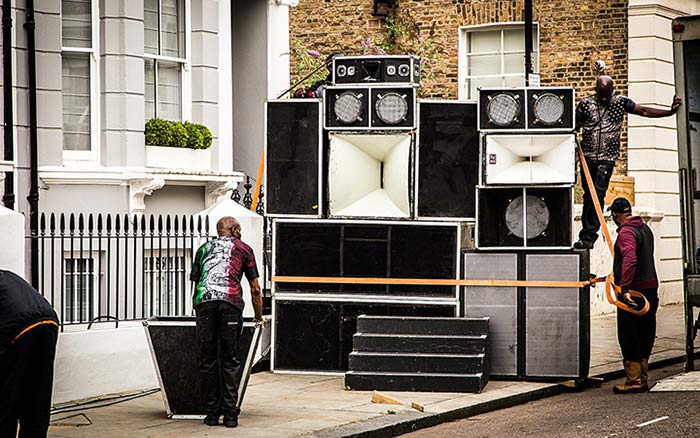
Credit: Adrian Scottow CC BY-SA 2.0
1973 | First sound systems turn up the volume of Notting Hill Carnival
Leslie Palmer has been involved with the carnival since its inception and was a key player in bringing sound systems to the party.
He took over the role of organiser in 1973 and decided to make it inclusive of all Caribbean islands and introduce static sound systems, a feature unique to Notting Hill’s event. Leslie later went on to work for legendary label Island Records, received an MBE and continues to contribute to the event to this day.
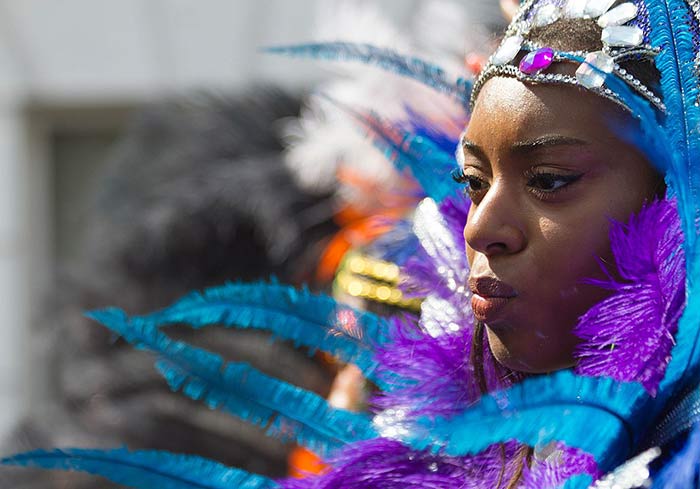
Credit: Kalexander2010 CC BY-SA 2.0
1979 | Live music
Music promoter Wilf Walker was behind the introduction of live music to the Notting Hill Carnival at the end of the seventies. Aswad and Eddie Grant were among the first bands to perform with Wilf going on to book artists at the Glastonbury Music Festival too.
1985 | Linett Kamala becomes the first woman DJ to perform at carnival
Linett Kamala, aka DJ Thunderbird, was the first woman to take on the decks at Notting Hill Carnival as a teenager.
She played at the Disya Jeneration soundsystem at Powis Gardens, one of the event’s oldest sound systems.
Did you know? Linett is now a tutor at ICMP, find out more here.
In an interview with Time Out, Linett said: “I'm from Harlesden, which is the root of reggae music in the UK. I grew up with sound systems everywhere.”
I had been practising for ages leading up to carnival so I was prepared when the time came. I remember scratching the records, playing electro music, then I grabbed the microphone and said ‘Make some noise’ and I just felt, ‘Wow, this is incredible!’ I think that’s the moment I got bitten by the carnival bug. I just remember this moment of joy, I was absolutely hooked.”
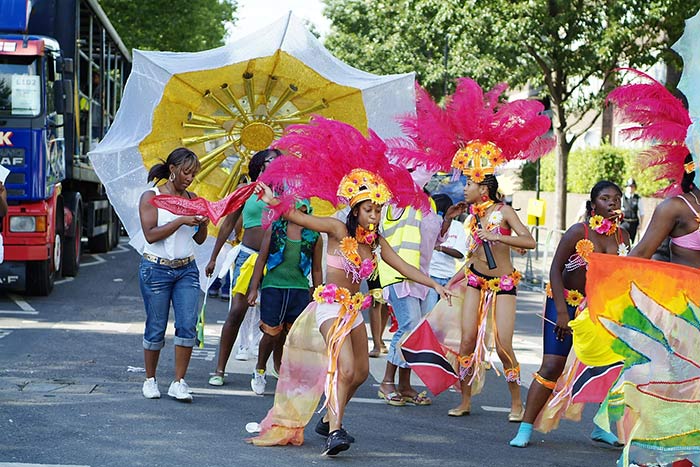
Credit: S Pakhrin CC BY 2.0
1989 | Mahogany Carnival Arts
Mahogany Carnival Arts is a multi-disciplinary group of creatives led by costume-maker Clary Salandy and structural engineer Michael Ramdeen.
Since it was launched in 1989, the company has grown carnival costumes utilising the human body in the art form of “Mas Making”, Masquerade or Street Theatre, developing sculptural costumes for events.
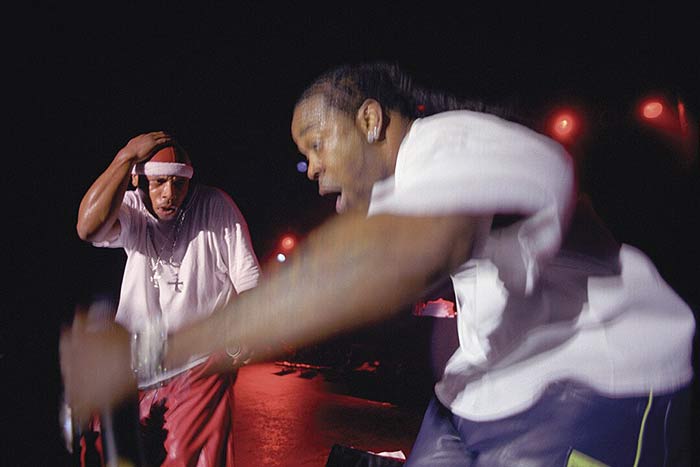
Credit: Mikamote - Own work, CC BY-SA 3.0 Link
1997 | Hip hop legends perform at Notting Hill Carnival
While the sound systems - Rampage, Channel One, Aba-Shanti - are an essential part of Notting Hill’s musical story, there have been many music stars to also perform at the event.
The likes of Jay-Z, Busta Rhymes, Lil Kim, and Destiny’s Child are among the heavy hitters to provide show-stopping moments among the soundtrack of bass-heavy dancehall, soca, reggae, dub and more.
2018 | Grenfell
With Grenfell Tower clearly visible from the Notting Hill Carnival’s parade route, the organisers worked with Grenfell United in the wake of the June 2017 disaster to pay respects to victims.
Notting Hill Carnival organisers held a 72 second silence on both days of the event in 2018 and in 2019 to honour those who died - one second for each life lost in the fire.
Visit grenfellunited.org to find out more.
2020/2021 | Pandemic and online
In 2021 and 2022, Notting Hill Carnival was forced off the streets due to Covid-19 and the various lockdown restrictions put in place.
Instead the party was streamed online for two consecutive years. Then, when the event was safe enough to be staged in real life, it came back hard - the number of Mas bands and static sound systems was increased to 84 and 38 respectively in 2022 when the event was held again.
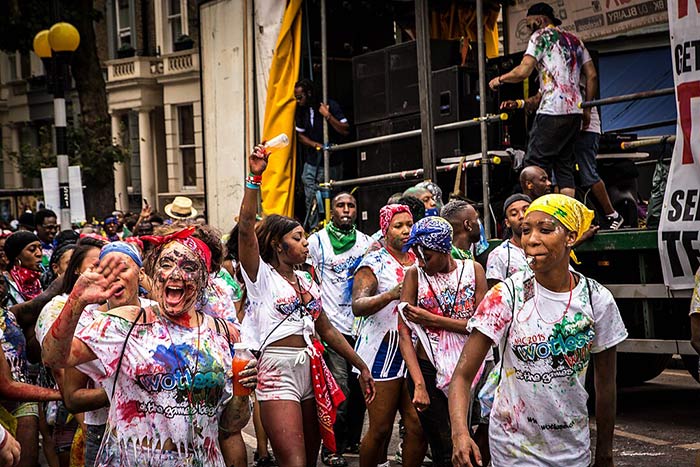
Credit: Adrian Scottow from London, England - IMG_8001.jpg, CC BY-SA 2.0
2023 | 75 years of Windrush
Bands playing at this year’s Notting Hill carnival paid homage to the Windrush generation as the 2023 event coincided with the 75th anniversary of the ship’s arrival in Britain. Honouring those passengers on the boat that landed in the UK back in 1948 was a brilliant way of remembering why the event started in the first place all those years ago.
ICMP is incredibly proud to be based in London, alongside events of such significant cultural importance. We're also thrilled this year to announce that Linett Kamala has joined our tutor team and will now share her knowledge and wisdom with our Live Event Management students.
Find out more: nhcarnival.org
Cover image: Romazur - Own work, CC BY-SA 3.0
Learn how to conceive and create live event experiences that last a lifetime
Gain a holistic overview of the live events industry with our pioneering BA (Hons) Live Event and Festival Management degree. Explore the concepts of live production, event management and the live music ecosystem, as you expand and put into practice your creative and entrepreneurial skills. Developed in consultation with key bodies in the industry, it has the ever-evolving live music ecosystem at its core.
Hit the link below, or speak to our friendly Admissions Team via our Live Chat or phone on 020 8038 3325, to find out more.
Full course details
Gain a holistic overview of the live events industry with our pioneering BA (Hons) Live Event and Festival Management degree. Explore the concepts of live production, event management and the live music ecosystem, as you expand and put into practice your creative and entrepreneurial skills. Developed in consultation with key bodies in the industry, it has the ever-evolving live music ecosystem at its core.
Hit the link below, or speak to our friendly Admissions Team via our Live Chat or phone on 020 8038 3325, to find out more.






